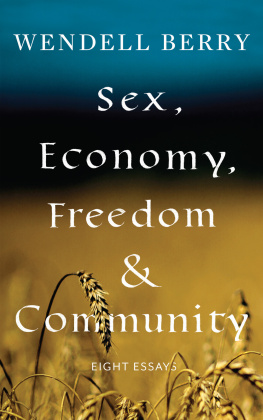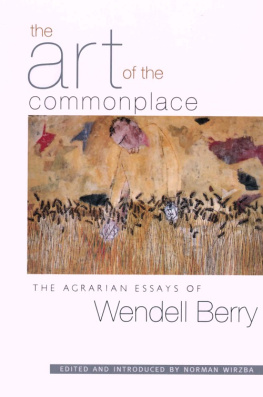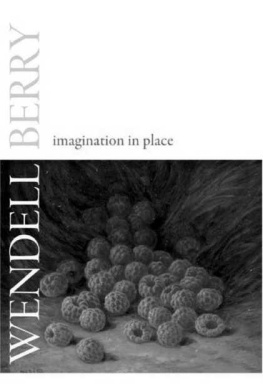
Praise for
Sex, Economy, Freedom & Community
Berrys words are those of a steward. He is trying to preserve that which is intimate, honest, and good. He is an intense, angry, but always caring critic of American culture. His aim is to instill a sense of mission that would cause his readers to begin to buildor rebuildtheir local communities.
Lexington Herald-Leader
Wendell Berry is among our wisest and most clear-sighted thinkers; one can hardly speak of him without the word prophetic coming to mind. Writing with grace and sanity from his Kentucky farmstead, his words contain enough common sense to turn absurdity on its head, and because the truth is both simpler and more subtle than any ideology, to challenge the assumptions of every one of our shallow ideological camps.
Caelum Et Terra
Sex, Economy,
Freedom &
Community
MORE ESSAYS BY WENDELL BERRY
The Art of Loading Brush
Another Turn of the Crank
The Art of the Commonplace
Blessed Are the Peacemakers
Bringing It to the Table
Citizenship Papers
A Continuous Harmony
The Gift of Good Land
Harlan Hubbard
The Hidden Wound
Home Economics
Imagination in Place
It All Turns on Affection
Life Is a Miracle
Our Only World
The Long-Legged House
The Poetry of William Carlos Williams of Rutherford
Recollected Essays: 19651980
Standing by Words
The Unforeseen Wilderness
The Unsettling of America
The Way of Ignorance
What Are People For?
What Matters?
The World-Ending Fire

Sex, Economy, Freedom & Community
Copyright 1992, 1993 by Wendell Berry
Originally published in hardcover by Pantheon Books, a division of Random House, Inc., in 1993
First Counterpoint paperback edition: 2018
All rights reserved under International and Pan-American Copyright Conventions. No part of this book may be used or reproduced in any manner whatsoever without written permission from the publisher, except in the case of brief quotations embodied in critical articles and reviews.
I am grateful to the Louisville Community Foundation, which printed parts I and II of Sex, Economy, Freedom, and Community as a pamphlet, and also to the editors of the following periodicals, in whose pages some of the other essays in the book were previously printed: The Louisville Courier-Journal , The Atlantic Monthly , The Progressive , Journal of the Soil and Water Conservation Society , Wild Earth, Amicus Journal , The Land Report , Appalachia , Northern Forest Forum .
Library of Congress Cataloging-in-Publication Data
Names: Berry, Wendell, 1934 author.
Title: Sex, economy, freedom & community : eight essays / Wendell Berry.
Other titles: Sex, economy, freedom and community
Description: Berkeley, California : Counterpoint, [2018] | Includes bibliographical references.
Identifiers: LCCN 2018021077 | ISBN 9781640091405 | eISBN 9781640091399
Subjects: LCSH: United StatesSocial conditions. | Social problems. | Communities.
Classification: LCC HN59.2 .B47 2019 | DDC 306.0973dc23
LC record available at https://lccn.loc.gov/2018021077
Cover design by Nicole Caputo
Book design by Jordan Koluch
COUNTERPOINT
2560 Ninth Street, Suite 318
Berkeley, CA 94710
www.counterpointpress.com
Printed in the United States of America
Distributed by Publishers Group West
10 9 8 7 6 5 4 3 2 1
I dedicate this book to the memory of Harry M. Caudill and Edward Abbey, great defenders of their homelands, and of Tom Marsh, who taught that the useful could and should be beautiful.
CONTENTS
PREFACE
The Joy of Sales Resistance
Dear Reader,
This is a book about sales resistance. We live in a time when technologies and ideas (often the same thing) are adopted in response not to need but to advertising, salesmanship, and fashion. Salesmen and saleswomen now hover about us as persistently as angels, intent on doing us good according to instructions set forth by persons educated at great public expense in the arts of greed and prevarication. These salespeople are now with most of us, apparently, even in our dreams.
The first duty of writers who wish to be of any use even to themselves is to resist the language, the ideas, and the categories of this ubiquitous sales talk, no matter from whose mouth it issues. But, then, this is also the first duty of everybody else. Nobody who is awake accepts the favors of these hawkers of guaranteed satisfactions, these escape artists, these institutional and commercial fanatics, whether politically correct or politically incorrect. Nobody who understands the history of justice or of the imagination (largely the same history) wants to be treated as a member of a category.
I am more and more impressed by the generality of the assumption that human lives are properly to be invented by an academic-corporate-governmental elite and then either sold to their passive and choiceless recipients or doled out to them in the manner of welfare payments. Any necessary thinkingso the assumption goeswill be done by certified smart people in offices, laboratories, boardrooms, and other high places and then will be handed down to supposedly unsmart people in low placeswho will also be expected to do whatever actual work cannot be done cheaper by machines.
Such a society, whose members are expected to think and do and provide nothing for themselves, will necessarily give a high place to salesmanship. For such a society cannot help but encourage the growth of a kind of priesthood of men and women who know exactly what you need and who just happen to have it for you, attractively packaged and at a price no competitor can beat. If you wish to be among the beautiful, then you must buy the right fashions (there are no cheap fashions) and the right automobile (not cheap either). If you want to be counted as one of the intelligent, then you must shop for the right education (not cheap but also not difficult).
Actually, as we know, the new commercial education is fun for everybody. All you have to do in order to have or to provide such an education is to pay your money (in advance) and master a few simple truths:
- Educated people are more valuable than other people because education is a value-adding industry.
- Educated people are better than other people because education improves people and makes them good.
- The purpose of education is to make people able to earn more and more money.
- The place where education is to be used is called your career.
- Anything that cannot be weighed, measured, or counted does not exist.
- The so-called humanities probably do not exist. But if they do, they are useless. But whether they exist or not or are useful or not, they can sometimes be made to support a career.
- Literacy does not involve knowing the meanings of words, or learning grammar, or reading books.
- The sign of exceptionally smart people is that they speak a language that is intelligible only to other people in their field or only to themselves. This is very impressive and is known as professionalism.
- The smartest and most educated people are the scientists, for they have already found solutions to all our problems and will soon find solutions to all the problems resulting from their solutions to all the problems we used to have.
- The mark of a good teacher is that he or she spends most of his or her time doing research and writes many books and articles.
Next page











